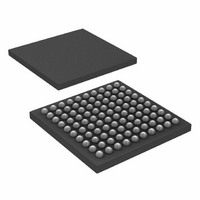ATSAM3S4CA-CU Atmel, ATSAM3S4CA-CU Datasheet - Page 123

ATSAM3S4CA-CU
Manufacturer Part Number
ATSAM3S4CA-CU
Description
IC MCU 32BIT 256KB FLASH 100BGA
Manufacturer
Atmel
Series
SAM3Sr
Specifications of ATSAM3S4CA-CU
Core Processor
ARM® Cortex-M3™
Core Size
32-Bit
Speed
64MHz
Connectivity
EBI/EMI, I²C, MMC, SPI, SSC, UART/USART, USB
Peripherals
Brown-out Detect/Reset, DMA, I²S, POR, PWM, WDT
Number Of I /o
79
Program Memory Size
256KB (256K x 8)
Program Memory Type
FLASH
Ram Size
48K x 8
Voltage - Supply (vcc/vdd)
1.62 V ~ 1.95 V
Data Converters
A/D 16x10/12b, D/A 2x12b
Oscillator Type
Internal
Operating Temperature
-40°C ~ 85°C
Package / Case
100-LFBGA
Processor Series
ATSAM3x
Core
ARM Cortex M3
3rd Party Development Tools
JTRACE-CM3, MDK-ARM, RL-ARM, ULINK2
Development Tools By Supplier
ATSAM3S-EK
Package
100LFBGA
Device Core
ARM Cortex M3
Family Name
AT91
Maximum Speed
64 MHz
Operating Supply Voltage
1.8|3.3 V
Data Bus Width
32 Bit
Number Of Programmable I/os
79
Interface Type
I2C/I2S/SPI/UART/USART/USB
On-chip Adc
16-chx12-bit
On-chip Dac
2-chx12-bit
Number Of Timers
6
Lead Free Status / RoHS Status
Lead free / RoHS Compliant
Eeprom Size
-
Lead Free Status / Rohs Status
Details
Available stocks
Company
Part Number
Manufacturer
Quantity
Price
Company:
Part Number:
ATSAM3S4CA-CU
Manufacturer:
SANYO
Quantity:
1 000
- Current page: 123 of 1118
- Download datasheet (24Mb)
10.15 Saturating instructions
10.15.1
10.15.1.1
10.15.1.2
6500C–ATARM–8-Feb-11
SSAT and USAT
Syntax
Operation
This section describes the saturating instructions, SSAT and USAT.
Signed Saturate and Unsigned Saturate to any bit position, with optional shift before saturating.
where:
op
cond
Rd
n
Rm
shift #s
These instructions saturate to a signed or unsigned n-bit value.
The SSAT instruction applies the specified shift, then saturates to the signed range −
2
The USAT instruction applies the specified shift, then saturates to the unsigned range 0 ≤x ≤2
For signed n-bit saturation using SSAT, this means that:
For unsigned n-bit saturation using USAT, this means that:
If the returned result is different from the value to be saturated, it is called saturation. If satura-
tion occurs, the instruction sets the Q flag to 1 in the APSR. Otherwise, it leaves the Q flag
unchanged. To clear the Q flag to 0, you must use the MSR instruction, see
To read the state of the Q flag, use the MRS instruction, see
n–1
• if the value to be saturated is less than − 2
• if the value to be saturated is greater than 2
• otherwise, the result returned is the same as the value to be saturated.
• if the value to be saturated is less than 0, the result returned is 0
• if the value to be saturated is greater than 2
• otherwise, the result returned is the same as the value to be saturated.
op{cond} Rd, #n, Rm {, shift #s}
≤x ≤2
SSAT
USAT
n ranges from 1 to 32 for SSAT
n ranges from 0 to 31 for USAT.
ASR #s where s is in the range 1 to 31
LSL #s where s is in the range 0 to 31.
n–1
− 1.
is one of:
Saturates a signed value to a signed range.
Saturates a signed value to an unsigned range.
is an optional condition code, see
is the destination register.
specifies the bit position to saturate to:
is the register containing the value to saturate.
is an optional shift applied to Rm before saturating. It must be one of the following:
n− 1
, the result returned is − 2
n− 1
n
− 1, the result returned is 2
“Conditional execution” on page
− 1, the result returned is 2
SAM3S Preliminary
“MRS” on page
n-1
n
− 1
n-1
“MSR” on page
143.
− 1
84.
144.
123
n
− 1.
Related parts for ATSAM3S4CA-CU
Image
Part Number
Description
Manufacturer
Datasheet
Request
R

Part Number:
Description:
KIT EVAL FOR ATSAM3S4C
Manufacturer:
Atmel
Datasheet:

Part Number:
Description:
Development Boards & Kits - ARM EVAL KIT SAM3S8 & SAM3SD8 series
Manufacturer:
Atmel
Datasheet:

Part Number:
Description:
AT91 ARM Cortex M3-based Processor
Manufacturer:
ATMEL [ATMEL Corporation]
Datasheet:

Part Number:
Description:
DEV KIT FOR AVR/AVR32
Manufacturer:
Atmel
Datasheet:

Part Number:
Description:
INTERVAL AND WIPE/WASH WIPER CONTROL IC WITH DELAY
Manufacturer:
ATMEL Corporation
Datasheet:

Part Number:
Description:
Low-Voltage Voice-Switched IC for Hands-Free Operation
Manufacturer:
ATMEL Corporation
Datasheet:

Part Number:
Description:
MONOLITHIC INTEGRATED FEATUREPHONE CIRCUIT
Manufacturer:
ATMEL Corporation
Datasheet:

Part Number:
Description:
AM-FM Receiver IC U4255BM-M
Manufacturer:
ATMEL Corporation
Datasheet:

Part Number:
Description:
Monolithic Integrated Feature Phone Circuit
Manufacturer:
ATMEL Corporation
Datasheet:

Part Number:
Description:
Multistandard Video-IF and Quasi Parallel Sound Processing
Manufacturer:
ATMEL Corporation
Datasheet:

Part Number:
Description:
High-performance EE PLD
Manufacturer:
ATMEL Corporation
Datasheet:

Part Number:
Description:
8-bit Flash Microcontroller
Manufacturer:
ATMEL Corporation
Datasheet:











